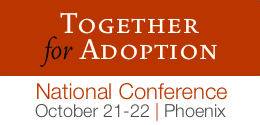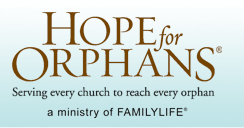Celebrating Adoption in the Church
 Tuesday, September 23, 2008 at 9:32AM
Tuesday, September 23, 2008 at 9:32AM  Fantastic brief article by Albert Mohler that gives a "pulse" on the movement in Churches to advocate for orphans through adoption, church adoption funds, and the development of adoptive families become some of the fabric of our churches!
Fantastic brief article by Albert Mohler that gives a "pulse" on the movement in Churches to advocate for orphans through adoption, church adoption funds, and the development of adoptive families become some of the fabric of our churches!
One of the great models of churches doing adoption/foster ministry is the Tapestry Adoption & Foster Care Ministry - check out what they are doing!
Lifesong for Orphans has had the privilege to work with some committed churches in the Louisville area, to establish these Church Adoption Funds:
LOCI (Louisville Orphan Care Initiative)
What a joy to work with the orphan advocates in these churches!
____________________________________________________________________________________________
The Culture of the Congregation: Celebrating Adoption
Albert Mohler
President, Southern Baptist Theological Seminary
September 4, 2008
The concept of adoption is nearly universal. In the classic sense it is the formal and legally recognized act of willingly receiving someone else's child as your own. In contrast to temporary guardianship or foster arrangements, adoption is permanent. Legally, adoption establishes a new identity for the child. In many cases around the world, adoption can mean the difference between life and death.
In the New Testament, adoption serves as a primary analogy of salvation. The sinner, who prior to faith in Christ is a rebel headed for destruction, is now adopted as a child of God. This new status is further defined as that of a joint-heir with Christ. By grace, the rebel child of the enemy is adopted as a child of the King. The former slave to sin is now a son or daughter of the heavenly Father.
As the Apostle Paul explains:
In the same way we also, when we were children, were enslaved to the elementary principles of the world. But when the fullness of time had come, God sent forth his Son, born of woman, born under the law, to redeem those who were under the law, so that we might receive adoption as sons. And because you are sons, God has sent the Spirit of his Son into our hearts, crying, “Abba! Father!” So you are no longer a slave, but a son, and if a son, then an heir through God. [Galatians 4:3-7, esv]
Further:
So then, brothers, we are debtors, not to the flesh, to live according to the flesh. For if you live according to the flesh you will die, but if by the Spirit you put to death the deeds of the body, you will live. For all who are led by the Spirit of God are sons of God. For you did not receive the spirit of slavery to fall back into fear, but you have received the Spirit of adoption as sons, by whom we cry, “Abba! Father!” The Spirit himself bears witness with our spirit that we are children of God, and if children, then heirs—heirs of God and fellow heirs with Christ, provided we suffer with him in order that we may also be glorified with him. [Romans 8:12-17, esv]
In recent years, American Christians have seen a recovery of adoption as a living concept -- and as a focus of congregational celebration.
Many evangelical congregations actively encourage families to adopt and offer support, education, and encouragement for international adoptions. This renewed interest among evangelicals attracted the attention of The Wall Street Journal. Naomi Schaefer Riley explains that adoption is now a "hot topic in the evangelical community" as Christians understand adoption to be a sanctity-of-human-life issue.
The article cites my colleague Russell Moore as a direct authority on the issue:
Russell Moore, the dean of the Southern Baptist Theological Seminary in Louisville, Ky., is the author of a forthcoming book called "Adopted for Life: The Priority of Adoption for Christian Families and Churches." A few years ago, Mr. Moore and his wife adopted two boys from
Given the vast number of at-risk orphans in the world -- now numbering in the millions -- this resurgence in adoption among American evangelicals should be a matter of public celebration. In the
As Naomi Schaefer Riley reports:
"There is much more openness to transracial adoption today," Ms. Rosati says. And Mr. Moore has been very vocal about this issue. Groups like the National Association of Black Social Workers have taken a strong stand against placing black children in the homes of white parents, a position that outrages Mr. Moore. He recently compared social workers who oppose transracial adoption to George Wallace. "Both are saying the same thing, 'Segregation now, segregation tomorrow, segregation forever.' And both pretend they're just being realistic about racial discrimination."
The command to "defend the orphan" (Isaiah 1:16-17) has always been vital to the Christian message, Mr. Moore tells me. One thing that distinguished early Christians from their pagan neighbors was their treatment of unwanted children. And adoption is also the literal manifestation of a metaphor that Christians use to describe themselves all the time. "Every one of us who follows Christ was adopted into an already existing family," says Mr. Moore.
Russell Moore has offered a clear and compelling basis for celebrating and encouraging adoption, and for refuting the lies of this age with the power of the Gospel of Jesus Christ, which is, after all, a Gospel of adoption.
For Christians, this is thus a matter of adoption by the adopted. Such is the











Reader Comments